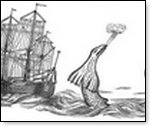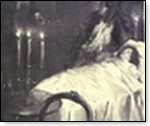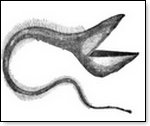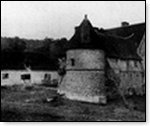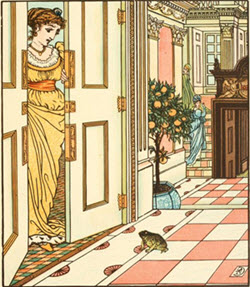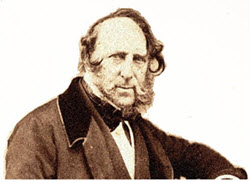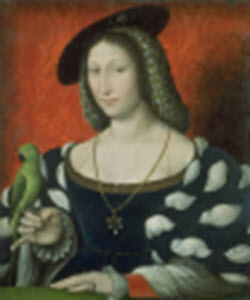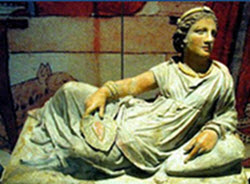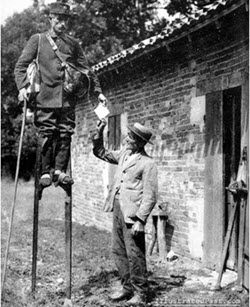The House on the Border Land
- by William Hope HodgsonHome > William Hope Hogdson > House on the Borderland
Online Text of The House on the Borderland
From the Manuscript discovered in 1877 by Messrs. Tonnison and Berreggnog
in the Ruins that
lie to the South of the Village of Kraighten, in the
West of Ireland. Set out here, with Notes.
TO MY FATHER
(Whose feet tread the lost aeons)
Open the door,
And listen!
Only the wind's muffled roar,
And the glisten
Of tears 'round the moon.
And, in fancy, the tread
Of vanishing shoon—
Out in the night with the Dead.
"Hush! And hark
To the sorrowful cry
Of the wind in the dark.
Hush and hark, without murmur or sigh,
To shoon that tread the lost aeons:
To the sound that bids you to die.
Hush and hark! Hush and Hark!"
Shoon of the Dead
AUTHOR'S INTRODUCTION TO THE MANUSCRIPT
Many are the hours in which I have pondered upon the story that is set forth in the following pages. I trust that my instincts are not awry when they prompt me to leave the account, in simplicity, as it was handed to me.
And the MS. itself—You must picture me, when first it was given into my care, turning it over, curiously, and making a swift, jerky examination. A small book it is; but thick, and all, save the last few pages, filled with a quaint but legible handwriting, and writ very close. I have the queer, faint, pit-water smell of it in my nostrils now as I write, and my fingers have subconscious memories of the soft, "cloggy" feel of the long-damp pages.
I read, and, in reading, lifted the Curtains of the Impossible that blind the mind, and looked out into the unknown. Amid stiff, abrupt sentences I wandered; and, presently, I had no fault to charge against their abrupt tellings; for, better far than my own ambitious phrasing, is this mutilated story capable of bringing home all that the old Recluse, of the vanished house, had striven to tell.
Of the simple, stiffly given account of weird and extraordinary matters, I will say little. It lies before you. The inner story must be uncovered, personally, by each reader, according to ability and desire. And even should any fail to see, as now I see, the shadowed picture and conception of that to which one may well give the accepted titles of Heaven and Hell; yet can I promise certain thrills, merely taking the story as a story.
WILLIAM HOPE HODGSON December 17, 1907
I
THE FINDING OF THE MANUSCRIPT
Right away in the west of Ireland lies a tiny hamlet called Kraighten. It is situated, alone, at the base of a low hill. Far around there spreads a waste of bleak and totally inhospitable country; where, here and there at great intervals, one may come upon the ruins of some long desolate cottage—unthatched and stark. The whole land is bare and unpeopled, the very earth scarcely covering the rock that lies beneath it, and with which the country abounds, in places rising out of the soil in wave-shaped ridges.
Yet, in spite of its desolation, my friend Tonnison and I had elected to spend our vacation there. He had stumbled on the place by mere chance the year previously, during the course of a long walking tour, and discovered the possibilities for the angler in a small and unnamed river that runs past the outskirts of the little village.
I have said that the river is without name; I may add that no map that I have hitherto consulted has shown either village or stream. They seem to have entirely escaped observation: indeed, they might never exist for all that the average guide tells one. Possibly this can be partly accounted for by the fact that the nearest railway station (Ardrahan) is some forty miles distant.
It was early one warm evening when my friend and I arrived in Kraighten. We had reached Ardrahan the previous night, sleeping there in rooms hired at the village post office, and leaving in good time on the following morning, clinging insecurely to one of the typical jaunting cars.
It had taken us all day to accomplish our journey over some of the roughest tracks imaginable, with the result that we were thoroughly tired and somewhat bad tempered. However, the tent had to be erected and our goods stowed away before we could think of food or rest. And so we set to work, with the aid of our driver, and soon had the tent up upon a small patch of ground just outside the little village, and quite near to the river.
Then, having stored all our belongings, we dismissed the driver, as he had to make his way back as speedily as possible, and told him to come across to us at the end of a fortnight. We had brought sufficient provisions to last us for that space of time, and water we could get from the stream. Fuel we did not need, as we had included a small oil-stove among our outfit, and the weather was fine and warm.
It was Tonnison's idea to camp out instead of getting lodgings in one of the cottages. As he put it, there was no joke in sleeping in a room with a numerous family of healthy Irish in one corner and the pigsty in the other, while overhead a ragged colony of roosting fowls distributed their blessings impartially, and the whole place so full of peat smoke that it made a fellow sneeze his head off just to put it inside the doorway.
Tonnison had got the stove lit now and was busy cutting slices of bacon into the frying pan; so I took the kettle and walked down to the river for water. On the way, I had to pass close to a little group of the village people, who eyed me curiously, but not in any unfriendly manner, though none of them ventured a word.
As I returned with my kettle filled, I went up to them and, after a friendly nod, to which they replied in like manner, I asked them casually about the fishing; but, instead of answering, they just shook their heads silently, and stared at me. I repeated the question, addressing more particularly a great, gaunt fellow at my elbow; yet again I received no answer. Then the man turned to a comrade and said something rapidly in a language that I did not understand; and, at once, the whole crowd of them fell to jabbering in what, after a few moments, I guessed to be pure Irish. At the same time they cast many glances in my direction. For a minute, perhaps, they spoke among themselves thus; then the man I had addressed faced 'round at me and said something. By the expression of his face I guessed that he, in turn, was questioning me; but now I had to shake my head, and indicate that I did not comprehend what it was they wanted to know; and so we stood looking at one another, until I heard Tonnison calling to me to hurry up with the kettle. Then, with a smile and a nod, I left them, and all in the little crowd smiled and nodded in return, though their faces still betrayed their puzzlement.
It was evident, I reflected as I went toward the tent, that the inhabitants of these few huts in the wilderness did not know a word of English; and when I told Tonnison, he remarked that he was aware of the fact, and, more, that it was not at all uncommon in that part of the country, where the people often lived and died in their isolated hamlets without ever coming in contact with the outside world.
"I wish we had got the driver to interpret for us before he left," I remarked, as we sat down to our meal. "It seems so strange for the people of this place not even to know what we've come for."
Tonnison grunted an assent, and thereafter was silent for a while.
Later, having satisfied our appetites somewhat, we began to talk, laying our plans for the morrow; then, after a smoke, we closed the flap of the tent, and prepared to turn in.
"I suppose there's no chance of those fellows outside taking anything?" I asked, as we rolled ourselves in our blankets.
Tonnison said that he did not think so, at least while we were about; and, as he went on to explain, we could lock up everything, except the tent, in the big chest that we had brought to hold our provisions. I agreed to this, and soon we were both asleep.
Next morning, early, we rose and went for a swim in the river; after which we dressed and had breakfast. Then we roused out our fishing tackle and overhauled it, by which time, our breakfasts having settled somewhat, we made all secure within the tent and strode off in the direction my friend had explored on his previous visit.
During the day we fished happily, working steadily upstream, and by evening we had one of the prettiest creels of fish that I had seen for a long while. Returning to the village, we made a good feed off our day's spoil, after which, having selected a few of the finer fish for our breakfast, we presented the remainder to the group of villagers who had assembled at a respectful distance to watch our doings. They seemed wonderfully grateful, and heaped mountains of what I presumed to be Irish blessings upon our heads.
Thus we spent several days, having splendid sport, and first-rate appetites to do justice upon our prey. We were pleased to find how friendly the villagers were inclined to be, and that there was no evidence of their having ventured to meddle with our belongings during our absences.
It was on a Tuesday that we arrived in Kraighten, and it would be on the Sunday following that we made a great discovery. Hitherto we had always gone up-stream; on that day, however, we laid aside our rods, and, taking some provisions, set off for a long ramble in the opposite direction. The day was warm, and we trudged along leisurely enough, stopping about mid-day to eat our lunch upon a great flat rock near the riverbank. Afterward we sat and smoked awhile, resuming our walk only when we were tired of inaction.
For perhaps another hour we wandered onward, chatting quietly and comfortably on this and that matter, and on several occasions stopping while my companion—who is something of an artist—made rough sketches of striking bits of the wild scenery.
And then, without any warning whatsoever, the river we had followed so confidently, came to an abrupt end—vanishing into the earth.
"Good Lord!" I said, "who ever would have thought of this?"
And I stared in amazement; then I turned to Tonnison. He was looking, with a blank expression upon his face, at the place where the river disappeared.
In a moment he spoke.
"Let us go on a bit; it may reappear again—anyhow, it is worth investigating."
I agreed, and we went forward once more, though rather aimlessly; for we were not at all certain in which direction to prosecute our search. For perhaps a mile we moved onward; then Tonnison, who had been gazing about curiously, stopped and shaded his eyes.
"See!" he said, after a moment, "isn't that mist or something, over there to the right—away in a line with that great piece of rock?" And he indicated with his hand.
I stared, and, after a minute, seemed to see something, but could not be certain, and said so.
"Anyway," my friend replied, "we'll just go across and have a glance." And he started off in the direction he had suggested, I following. Presently, we came among bushes, and, after a time, out upon the top of a high, boulder-strewn bank, from which we looked down into a wilderness of bushes and trees.
"Seems as though we had come upon an oasis in this desert of stone," muttered Tonnison, as he gazed interestedly. Then he was silent, his eyes fixed; and I looked also; for up from somewhere about the center of the wooded lowland there rose high into the quiet air a great column of hazelike spray, upon which the sun shone, causing innumerable rainbows.
"How beautiful!" I exclaimed.
"Yes," answered Tonnison, thoughtfully. "There must be a waterfall, or something, over there. Perhaps it's our river come to light again. Let's go and see."
Down the sloping bank we made our way, and entered among the trees and shrubberies. The bushes were matted, and the trees overhung us, so that the place was disagreeably gloomy; though not dark enough to hide from me the fact that many of the trees were fruit trees, and that, here and there, one could trace indistinctly, signs of a long departed cultivation. Thus it came to me that we were making our way through the riot of a great and ancient garden. I said as much to Tonnison, and he agreed that there certainly seemed reasonable grounds for my belief.
What a wild place it was, so dismal and somber! Somehow, as we went forward, a sense of the silent loneliness and desertion of the old garden grew upon me, and I felt shivery. One could imagine things lurking among the tangled bushes; while, in the very air of the place, there seemed something uncanny. I think Tonnison was conscious of this also, though he said nothing.
Suddenly, we came to a halt. Through the trees there had grown upon our ears a distant sound. Tonnison bent forward, listening. I could hear it more plainly now; it was continuous and harsh—a sort of droning roar, seeming to come from far away. I experienced a queer, indescribable, little feeling of nervousness. What sort of place was it into which we had got? I looked at my companion, to see what he thought of the matter; and noted that there was only puzzlement in his face; and then, as I watched his features, an expression of comprehension crept over them, and he nodded his head.
"That's a waterfall," he exclaimed, with conviction. "I know the sound now." And he began to push vigorously through the bushes, in the direction of the noise.
As we went forward, the sound became plainer continually, showing that we were heading straight toward it. Steadily, the roaring grew louder and nearer, until it appeared, as I remarked to Tonnison, almost to come from under our feet—and still we were surrounded by the trees and shrubs.
"Take care!" Tonnison called to me. "Look where you're going." And then, suddenly, we came out from among the trees, on to a great open space, where, not six paces in front of us, yawned the mouth of a tremendous chasm, from the depths of which the noise appeared to rise, along with the continuous, mistlike spray that we had witnessed from the top of the distant bank.
For quite a minute we stood in silence, staring in bewilderment at the sight; then my friend went forward cautiously to the edge of the abyss. I followed, and, together, we looked down through a boil of spray at a monster cataract of frothing water that burst, spouting, from the side of the chasm, nearly a hundred feet below.
"Good Lord!" said Tonnison.
I was silent, and rather awed. The sight was so unexpectedly grand and eerie; though this latter quality came more upon me later.
Presently, I looked up and across to the further side of the chasm. There, I saw something towering up among the spray: it looked like a fragment of a great ruin, and I touched Tonnison on the shoulder. He glanced 'round, with a start, and I pointed toward the thing. His gaze followed my finger, and his eyes lighted up with a sudden flash of excitement, as the object came within his field of view.
"Come along," he shouted above the uproar. "We'll have a look at it. There's something queer about this place; I feel it in my bones." And he started off, 'round the edge of the craterlike abyss. As we neared this new thing, I saw that I had not been mistaken in my first impression. It was undoubtedly a portion of some ruined building; yet now I made out that it was not built upon the edge of the chasm itself, as I had at first supposed; but perched almost at the extreme end of a huge spur of rock that jutted out some fifty or sixty feet over the abyss. In fact, the jagged mass of ruin was literally suspended in midair.
Arriving opposite it, we walked out on to the projecting arm of rock, and I must confess to having felt an intolerable sense of terror as I looked down from that dizzy perch into the unknown depths below us—into the deeps from which there rose ever the thunder of the falling water and the shroud of rising spray.
Reaching the ruin, we clambered 'round it cautiously, and, on the further side, came upon a mass of fallen stones and rubble. The ruin itself seemed to me, as I proceeded now to examine it minutely, to be a portion of the outer wall of some prodigious structure, it was so thick and substantially built; yet what it was doing in such a position I could by no means conjecture. Where was the rest of the house, or castle, or whatever there had been?
I went back to the outer side of the wall, and thence to the edge of the chasm, leaving Tonnison rooting systematically among the heap of stones and rubbish on the outer side. Then I commenced to examine the surface of the ground, near the edge of the abyss, to see whether there were not left other remnants of the building to which the fragment of ruin evidently belonged. But though I scrutinized the earth with the greatest care, I could see no signs of anything to show that there had ever been a building erected on the spot, and I grew more puzzled than ever.
Then, I heard a cry from Tonnison; he was shouting my name, excitedly, and without delay I hurried along the rocky promontory to the ruin. I wondered whether he had hurt himself, and then the thought came, that perhaps he had found something.
I reached the crumbled wall and climbed 'round. There I found Tonnison standing within a small excavation that he had made among the débris: he was brushing the dirt from something that looked like a book, much crumpled and dilapidated; and opening his mouth, every second or two, to bellow my name. As soon as he saw that I had come, he handed his prize to me, telling me to put it into my satchel so as to protect it from the damp, while he continued his explorations. This I did, first, however, running the pages through my fingers, and noting that they were closely filled with neat, old-fashioned writing which was quite legible, save in one portion, where many of the pages were almost destroyed, being muddied and crumpled, as though the book had been doubled back at that part. This, I found out from Tonnison, was actually as he had discovered it, and the damage was due, probably, to the fall of masonry upon the opened part. Curiously enough, the book was fairly dry, which I attributed to its having been so securely buried among the ruins.
Having put the volume away safely, I turned-to and gave Tonnison a hand with his self-imposed task of excavating; yet, though we put in over an hour's hard work, turning over the whole of the upheaped stones and rubbish, we came upon nothing more than some fragments of broken wood, that might have been parts of a desk or table; and so we gave up searching, and went back along the rock, once more to the safety of the land.
The next thing we did was to make a complete tour of the tremendous chasm, which we were able to observe was in the form of an almost perfect circle, save for where the ruin-crowned spur of rock jutted out, spoiling its symmetry.
The abyss was, as Tonnison put it, like nothing so much as a gigantic well or pit going sheer down into the bowels of the earth.
For some time longer, we continued to stare about us, and then, noticing that there was a clear space away to the north of the chasm, we bent our steps in that direction.
Here, distant from the mouth of the mighty pit by some hundreds of yards, we came upon a great lake of silent water—silent, that is, save in one place where there was a continuous bubbling and gurgling.
Now, being away from the noise of the spouting cataract, we were able to hear one another speak, without having to shout at the tops of our voices, and I asked Tonnison what he thought of the place—I told him that I didn't like it, and that the sooner we were out of it the better I should be pleased.
He nodded in reply, and glanced at the woods behind furtively. I asked him if he had seen or heard anything. He made no answer; but stood silent, as though listening, and I kept quiet also.
Suddenly, he spoke.
"Hark!" he said, sharply. I looked at him, and then away among the trees and bushes, holding my breath involuntarily. A minute came and went in strained silence; yet I could hear nothing, and I turned to Tonnison to say as much; and then, even as I opened my lips to speak, there came a strange wailing noise out of the wood on our left.... It appeared to float through the trees, and there was a rustle of stirring leaves, and then silence.
All at once, Tonnison spoke, and put his hand on my shoulder. "Let us get out of here," he said, and began to move slowly toward where the surrounding trees and bushes seemed thinnest. As I followed him, it came to me suddenly that the sun was low, and that there was a raw sense of chilliness in the air.
Tonnison said nothing further, but kept on steadily. We were among the trees now, and I glanced around, nervously; but saw nothing, save the quiet branches and trunks and the tangled bushes. Onward we went, and no sound broke the silence, except the occasional snapping of a twig under our feet, as we moved forward. Yet, in spite of the quietness, I had a horrible feeling that we were not alone; and I kept so close to Tonnison that twice I kicked his heels clumsily, though he said nothing. A minute, and then another, and we reached the confines of the wood coming out at last upon the bare rockiness of the countryside. Only then was I able to shake off the haunting dread that had followed me among the trees.
Once, as we moved away, there seemed to come again a distant sound of wailing, and I said to myself that it was the wind—yet the evening was breathless.
Presently, Tonnison began to talk.
"Look you," he said with decision, "I would not spend the night in that place for all the wealth that the world holds. There is something unholy—diabolical—about it. It came to me all in a moment, just after you spoke. It seemed to me that the woods were full of vile things—you know!"
"Yes," I answered, and looked back toward the place; but it was hidden from us by a rise in the ground.
"There's the book," I said, and I put my hand into the satchel.
"You've got it safely?" he questioned, with a sudden access of anxiety.
"Yes," I replied.
"Perhaps," he continued, "we shall learn something from it when we get back to the tent. We had better hurry, too; we're a long way off still, and I don't fancy, now, being caught out here in the dark."
It was two hours later when we reached the tent; and, without delay, we set to work to prepare a meal; for we had eaten nothing since our lunch at midday.
Supper over, we cleared the things out of the way, and lit our pipes. Then Tonnison asked me to get the manuscript out of my satchel. This I did, and then, as we could not both read from it at the same time, he suggested that I should read the thing out loud. "And mind," he cautioned, knowing my propensities, "don't go skipping half the book."
Yet, had he but known what it contained, he would have realized how needless such advice was, for once at least. And there seated in the opening of our little tent, I began the strange tale of The House on the Borderland (for such was the title of the MS.); this is told in the following pages.
Medieval Libraries | The Books of William Hope Hodgson | Embroidered Books | The Loves of Krishna | Improve Your Vocabulary | The Dance of Death | George MacDonald | Edgar Allan Poe | Articles | Egyptian Book of the Dead | Secret Hiding Places | Book Quotations | Books and Authors |
Book-Lover.com has an eclectic collection of weird and unusual books online. Site Map | What's New | About Us | Privacy | Contact Us
This is a website about William Hope Hodgson.

